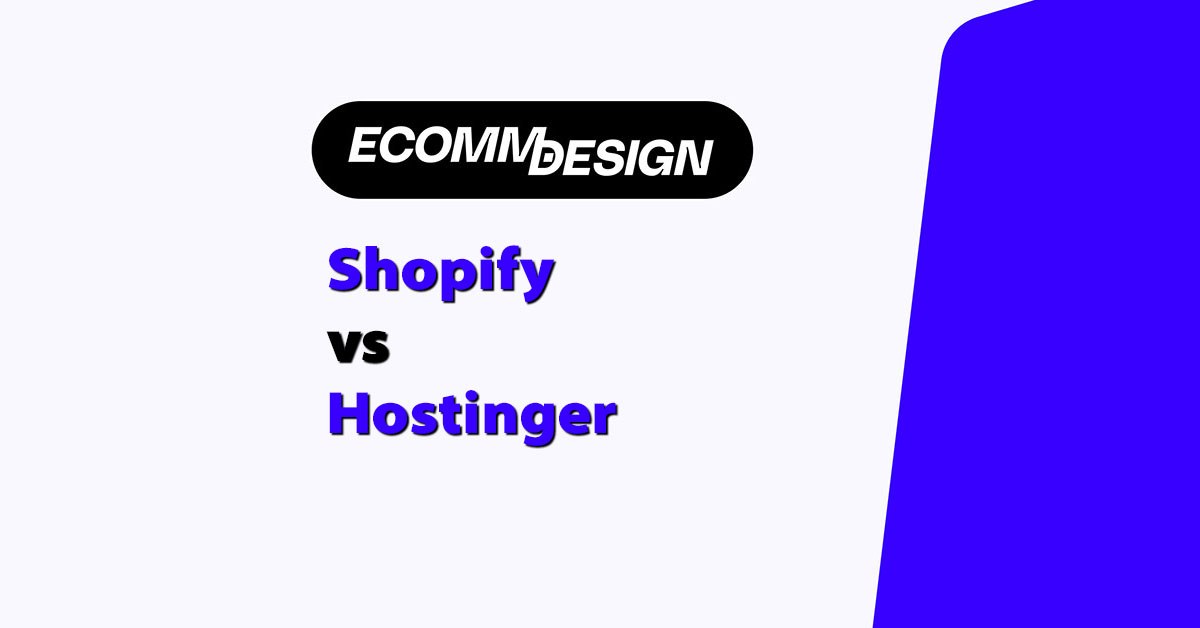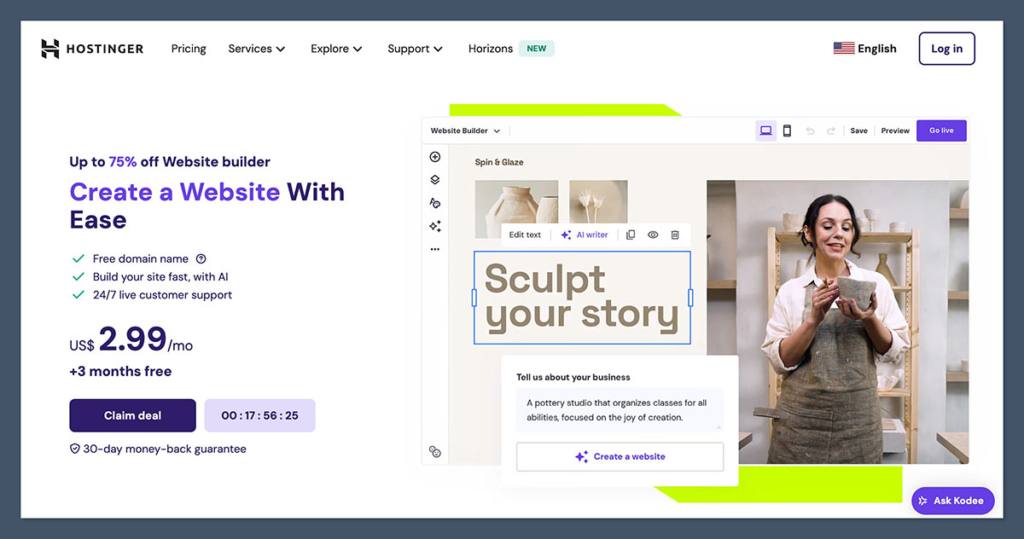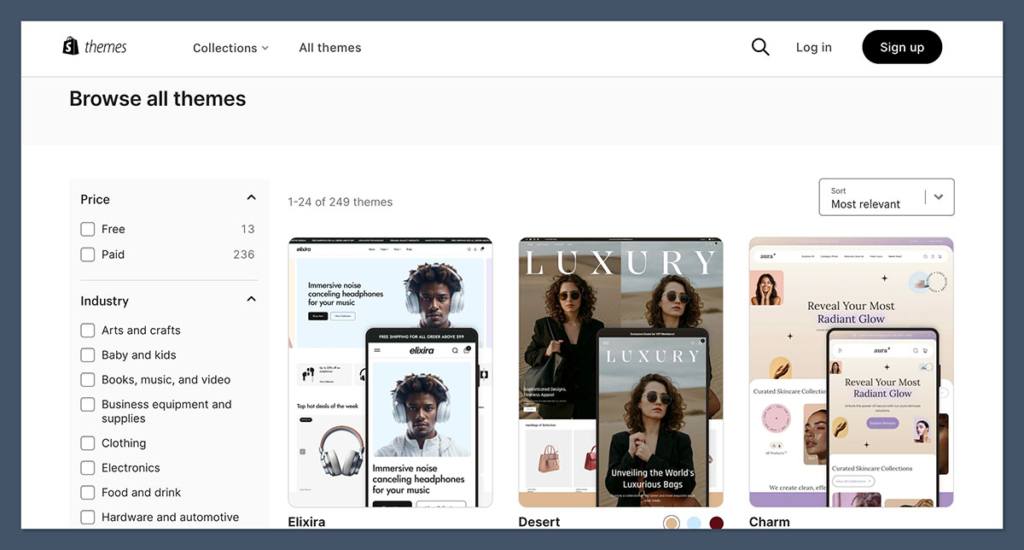
Choosing between Shopify and Hostinger is a big decision if you’re starting an ecommerce store.
While Shopify is known as a dedicated ecommerce platform with built-in sales tools, Hostinger is a budget-friendly hosting provider that can power your store through WordPress and WooCommerce.
To find out which one is better for selling online, I’ve spent over 100 hours testing both platforms across key ecommerce criteria like pricing, ease of use, sales features, SEO tools, and customer support.
After reviewing everything, Shopify comes out on top for serious sellers who want a streamlined experience and a platform built specifically for ecommerce.
Hostinger is a solid budget-friendly option, but it requires more technical work and plugin management to reach the same level.
Shopify vs Hostinger: Quick Verdict
Shopify – Best all-in-one platform for ecommerce beginners and scaling businesses
Hostinger – Best for tech-savvy users on a tight budget
In this review, I’ll break down how Shopify and Hostinger compare across all the major categories that matter when launching an ecommerce business.
Quick Comparison: Shopify vs Hostinger
Here’s a side-by-side comparison of the two platforms based on my hands-on testing:
| Feature | Shopify | Hostinger + WooCommerce |
|---|---|---|
| Best For | All-in-one ecommerce solution | Budget ecommerce with custom control |
| Starting Price | $29/month | $2.99/month (hosting) + plugin costs |
| Free Trial | 3 days | 30 days (hosting) |
| Ecommerce Tools | Built-in | Requires setup via plugins |
| SEO | Strong default features | Full control via plugins |
| Themes/Templates | 190+ (13 free) | 150+ WordPress themes (many free) |
| App/Plugin Market | 8,000+ apps | 50,000+ plugins via WordPress |
| Support | 24/7 ecommerce support | 24/7 general hosting support |
| Uptime/Speed | High-performing global infrastructure | Varies by plan and setup |
Best for Pricing: Hostinger Wins on Affordability

If budget is your top priority, Hostinger is the more affordable option.
Shopify includes everything in its pricing, but the monthly costs can add up quickly — especially if you’re scaling.
Shopify Pricing
Shopify offers three main plans, each designed for different stages of business growth:
| Plan | Price (USD/month) | Key Features |
|---|---|---|
| Basic | $29 | 2 staff accounts, basic reports |
| Shopify | $79 | 5 staff, professional reports |
| Advanced | $299 | 15 staff, custom reporting, shipping rates |
Transaction Fees:
Shopify charges between 2.9% + 30¢ and 2.4% + 30¢ per sale unless you use Shopify Payments.
Free Trial:
3-day trial, followed by $1/month for 3 months on any paid plan.
Hostinger Pricing
Hostinger’s plans are extremely competitive. Here’s the breakdown for WooCommerce hosting:
| Plan | Price (USD/month) | Features |
|---|---|---|
| Woo Starter | $3.99 | 100 websites, 100 GB SSD, free email, SSL |
| Woo Business | $6.99 | 200 websites, daily backups, priority support |
| Woo Cloud Startup | $9.99 | Cloud hosting with better performance |
Additional Costs:
You’ll likely need to budget for:
- Premium WordPress theme: $50–$100 (one-time)
- Plugin subscriptions: $0–$200/year
- Developer support (optional)
Free Trial:
30-day money-back guarantee.
The Winner: Hostinger
While Shopify includes more built-in ecommerce tools, Hostinger is the clear winner if you’re looking for a low-cost option to get started.
Best for Selling Online: Shopify Offers Better Built-In Tools

Shopify is purpose-built for ecommerce, and it shows in its features. Everything is designed to help you sell more, with less effort.
Shopify Sales Features
With Shopify, you get a range of advanced sales tools as soon as you sign up:
- Abandoned cart recovery
- Discount codes and promotions
- Gift cards and customer accounts
- Shopify POS system for retail
- Real-time shipping rates
- Multi-channel selling (Facebook, Instagram, Amazon, etc.)
- Shopify Magic AI product descriptions
Shopify also supports 100+ payment gateways and includes inventory tracking, tax settings, and a secure checkout system.
Hostinger + WooCommerce Sales Features
WooCommerce is flexible and powerful, but almost every feature requires a plugin or manual setup.
You can still get:
- Abandoned cart recovery (via plugin)
- Discounts and coupons
- WooCommerce Payments or Stripe
- Inventory and order management
- Multi-channel selling via plugins
- AI copywriting with third-party tools
But keep in mind:
- You’re responsible for plugin updates and compatibility
- Some sales features require paid extensions
The Winner: Shopify
With sales tools built-in and ready to go, Shopify is a better choice for ecommerce-focused businesses who want to sell fast and scale efficiently.
Best for SEO: WooCommerce Offers More Control, but Shopify Wins for Simplicity
Both platforms can help you rank in Google — but the experience is very different depending on your technical skills.
Shopify SEO
Shopify includes strong out-of-the-box SEO tools:
- Automatic sitemap and robots.txt
- Editable meta titles and descriptions
- Image alt text fields
- Structured product data for rich results
- SEO-friendly URLs
- Fast hosting and mobile optimization
Shopify also offers the Ecommerce Booster app, built in collaboration with Semrush, to guide store owners through SEO best practices.
Hostinger SEO (via WordPress)
WooCommerce SEO is extremely customizable with plugins like:
- Rank Math or Yoast SEO for meta data and analysis
- Smush for image compression
- W3 Total Cache for performance optimization
- Redirection for managing URL changes
But you’ll need to:
- Manually optimize your site structure
- Choose a fast, lightweight theme
- Set up caching, CDN, and security plugins
The Winner: Shopify
If you want to get solid SEO results without deep technical work, Shopify has the edge. WooCommerce gives more control, but also requires more effort to avoid SEO mistakes.
Best for Ease of Use: Shopify Is Smoother for Beginners
When I tested both platforms, Shopify felt significantly more polished and guided.
Shopify Setup
Shopify walks you through a clear onboarding checklist:
- Add your first product
- Choose a theme
- Customize branding
- Set up domain and payments
- Launch your store
Its dashboard is clean, intuitive, and laser-focused on selling. You won’t get distracted by unnecessary options.
Hostinger Setup
Hostinger’s onboarding is fast — but building your ecommerce store with WooCommerce involves multiple steps:
- Install WordPress and WooCommerce
- Set up your theme
- Install required plugins
- Configure SEO, caching, security
There’s no built-in guide for ecommerce beginners. You’ll either need to follow online tutorials or already know how WordPress works.
The Winner: Shopify
If you’re just starting out or want to avoid tech hurdles, Shopify’s interface and onboarding experience make it the better choice.
Best Templates: Shopify’s Designs Look and Perform Better

Both platforms offer professionally designed templates — but Shopify’s are more polished and ecommerce-focused.
Shopify Templates
- 190+ total themes
- 13 free templates
- Premium themes: $100–$500 (one-time)
- Mobile-responsive and optimized for speed
- Industry-specific templates (fashion, electronics, food, etc.)
Themes come with built-in sections and customization options, making it easy to match your brand without needing a developer.
Hostinger (via WordPress)
You’ll use WordPress themes with WooCommerce compatibility:
- 150+ free WooCommerce themes
- Thousands of premium options (via ThemeForest, Astra, etc.)
- More flexibility but higher risk of plugin or theme conflicts
Theme quality varies depending on the developer, and some free options are outdated or poorly maintained.
The Winner: Shopify
Its template library is curated, modern, and ecommerce-first — with reliable performance and mobile optimization.
Best App/Plugin Store: Shopify Offers More Ecommerce Extensions
Both platforms allow you to extend your store’s features, but their approach is different.
Shopify App Store
- 8,000+ apps
- Organized by sales, marketing, shipping, inventory
- 1-click installs with support
- Includes AI tools, integrations, reviews, loyalty systems
Many apps are free, while others offer monthly subscriptions. Shopify prioritizes compatibility and reliability.
Because the apps are developed specifically for Shopify’s infrastructure, they tend to be more stable and less likely to conflict with each other
WooCommerce Plugin Marketplace
- Access to 50,000+ WordPress plugins
- Total freedom to add features or customizations
- Includes advanced functionality (subscriptions, booking, SEO)
But:
- Not all plugins are optimized for WooCommerce
- You’re responsible for updates and maintenance
- Conflicts between plugins can happen
On the flip side, WooCommerce offers a huge sandbox for experimentation and custom solutions. If you’re building a unique storefront or want features that Shopify’s ecosystem doesn’t support, WooCommerce gives you near-limitless options.
Developers love the freedom, but non-technical users might find the plugin bloat overwhelming and risky to manage over time.
The Winner: Shopify
Shopify’s app store is focused on ecommerce, vetted for quality, and easier to manage — especially for beginners.
Best Customer Support: Shopify Delivers Stronger Help for Sellers
Support matters when something breaks — and Shopify has the stronger system.
Shopify Support
- 24/7 live chat
- Community forums
- Help Center with tutorials and guides
- Priority support for higher-tier plans
I found the live chat especially responsive. For complex ecommerce issues, their advisors were helpful and knew the platform inside-out.
Another advantage is Shopify’s massive knowledge base and user community. There are endless guides, how-to videos, and community-generated solutions covering everything from SEO tweaks to app integrations.
Hostinger Support
- 24/7 live chat
- Help articles and tutorials
- Ticket support
- General hosting knowledge, not ecommerce-specific
While fast and friendly, Hostinger’s support isn’t tailored to WooCommerce issues. For plugin-related problems, you’ll often be redirected to developer forums.
That’s a common issue with platforms that aren’t dedicated to ecommerce — the support team often doesn’t specialize in the platform you’re building on.
The Winner: Shopify
If you want specialized ecommerce help 24/7, Shopify takes the lead.
Final Verdict: Shopify vs Hostinger
After comparing every major category, here’s how the platforms stack up:
| Category | Winner |
|---|---|
| Pricing | Hostinger |
| Sales Features | Shopify |
| Ease of Use | Shopify |
| SEO Capabilities | Shopify (ease), Hostinger (customization) |
| Templates & Design | Shopify |
| App Integrations | Shopify |
| Customer Support | Shopify |
Our Recommendation
Choose Shopify if:
- You want a full ecommerce solution out of the box
- You value support and simplicity
- You’re ready to invest in growing your business
Choose Hostinger if:
- You’re comfortable with WordPress
- You’re on a tight budget
- You want total control over your site’s backend
And if you’re still unsure, take advantage of both platforms’ free trials.
Spend an hour setting up the basics on each, and you’ll quickly see which one aligns best with how you work and what your business needs.






